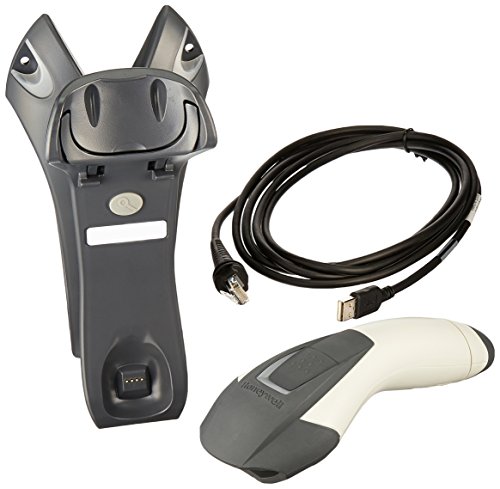

This Honeywell 1202G-1USB-5 Voyager 1202g ivory-colored handheld cordless barcode reader with USB cable and charger/communication base scans single-line linear 1D barcodes, including GS1 DataBar and RSS codes, and can wirelessly transmit data to the host system for decoding. A laser produces a single line of light that can scan barcodes at a speed of up to 100 scan lines per second. Two LEDs and an audible alert indicate whether a scan has succeeded or failed. The reader can decipher codes that are difficult to read or have been damaged or smudged. A CodeGate setting automatically activates the laser to display a scan line when a barcode is placed within range of the device's infrared (IR) sensor but prevents barcode data from being transmitted until a button is pushed to help reduce accidental scans. Honeywell Remote MasterMind software (not included) can be used by an administrator to manage the device remotely.
The reader can be connected directly to the host using the included USB cable or can use its Bluetooth capability to connect wirelessly to a base that has been wired to the host system (not included). The lithium-ion battery, which can be changed in the field without the use of tools, powers the barcode-reader battery for up to 12 hours and up to 45,000 scans on one charge. The charger/communication base's paging function assists in locating a misplaced reader by activating the reader's LEDs and audible signal. The base requires a power supply (sold separately). For a complete set of product specifications, please see the manufacturer's brochure.
| Specifications | |
|---|---|
| Data transmission style | Bluetooth wireless; USB cable |
| Radio/range | 2.4 to 2.5 GHz (ISM band) adaptive frequency hopping Bluetooth v2.1; Class 2: 33 ft. (10 m) line of sight |
| Battery | 1,800 mAh lithium-ion minimum. Up to 12 hours expected battery life or up to 45,000 scans per charge. |
| Charge time | 4 hours (expected) |
| Host system interfaces (charger/ communication base) | USB, RS-232, Keyboard Wedge, IBM 46xx (RS-485) |
| Scan pattern | Single scan line |
| Decode capability | Reads standard 1D and GS1 DataBar |
| Scan speed | 100 scan lines per second |
| Scan angle | 30 degrees (horizontal) |
| Pitch; skew | 60 degrees; 60 degrees |
| Print contrast | 10% minimum reflectance difference |
| Drop specs | Designed to withstand thirty 1.5 m (5 ft.) drops to concrete |
| Environmental sealing | IP42 |
| Reader dimensions* | 7.1 x 2.6 x 3.68 inches/180 x 66 x 3.6 mm (L x W x H) |
| Reader weight | 6.3 oz. (180 g) with battery |
| Color | Ivory |
* L is length, the horizontal distance from left to right; W is width, the horizontal distance from front to back; H is height, the vertical distance from bottom to top.
Barcode scanners, also known as barcode readers, can be used to scan and decode barcodes and to transmit barcode data to a computer or another host system. Barcode readers with a single-line laser can be used to scan linear, one-dimensional (1D) barcodes. Some lasers can produce light in an omnidirectional pattern to allow scanning of barcodes from different angles. Other barcode readers contain CCD (charge-coupled device) light sensors instead of a laser for accuracy and wear resistance. Barcode scanners with raster scanning, area imaging, and other scanning technologies can allow scanning of two-dimensional (2D) or Portable Document Format 417 (PDF417) barcodes, among other types. Some barcode readers provide onboard flash memory to allow the storage of barcode data before transmitting it to a computer or host system through a USB cable or wireless WLAN or Bluetooth connection. Many barcode readers have a handle for handheld use and come with a stand or a charging cradle for fixed position applications, while others are designed for stationary use on a counter or another flat surface. Some portable readers are small enough to be carried in a pocket or attached to a lanyard. Barcode readers are used at retail checkout counters and other points of sale (POS) locations and in warehouses and shipping facilities.
Honeywell manufactures products, materials, and technologies used in aerospace, transportation, and automation and control systems. The company, founded in 1885, is headquartered in Morristown, NJ.
Copyright © 2024 상지서비스. All Rights Reserved.